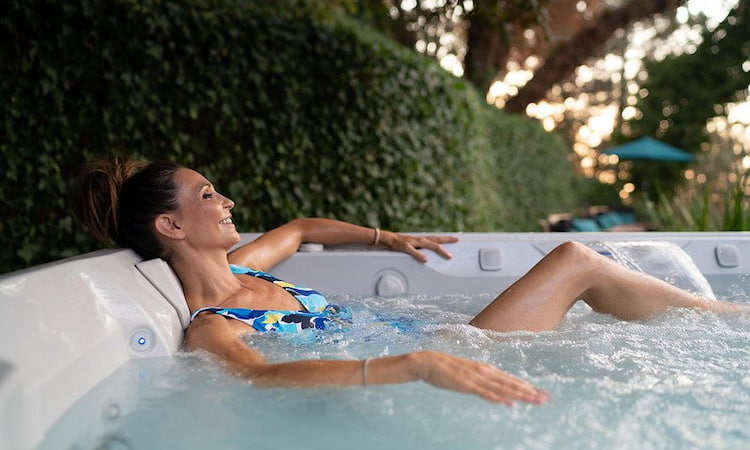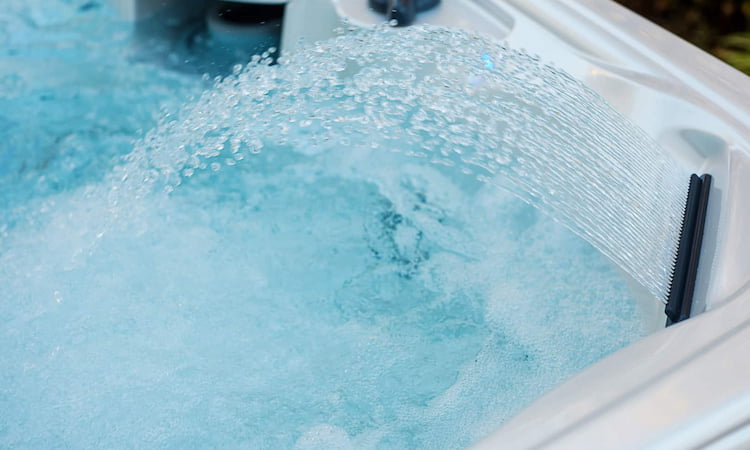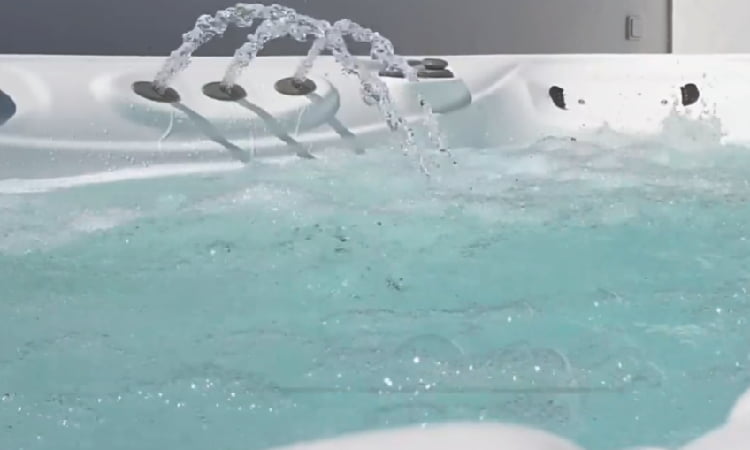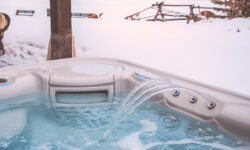You’re relaxing in your hot tub, but something’s off. Could it be the water’s hardness? Low levels can damage your tub and affect your skin. Don’t worry, you’ve got options.
To increase water hardness in a hot tub, you need to add a calcium increaser, which is available in most pool supply stores. After adding the calcium increaser, run the hot tub’s circulation system for about 2 hours. Lastly, retest the water to ensure the hardness level is within the recommended range of 100-200 parts per million.
Whether you’re looking for natural or chemical solutions, we’ve got you covered. Let’s dive into how to increase the water hardness in your hot tub and keep your soak safe and satisfying.

Quick Navigation
How to Know if Your Hot Tub Water Hardness is Too Low?
You’ll first need to test the water in your tub to determine if the hardness level is too low.
Grab a water hardness test kit from a local pool supply store or online. These kits typically contain a vial, reagent, and color chart. Fill the vial with the water from your tub, add the reagent, and compare the color change to the chart.
If you’re finding that your water’s hardness is below 100 parts per million (ppm), it’s considered soft. Soft water can be problematic because it can cause foaming, affect the tub’s pH levels, and lead to corrosion of the heater element and other components.
Don’t fret if your hot tub water is soft – you can fix it. You’ll need to add a calcium booster, which usually comes in liquid or granular form. Always add the booster while the tub’s jets are running to ensure proper distribution.
Is a Hot Tub With Low Water Hardness Safe to Use?
So, where does this leave you, and is it actually safe to use a hot tub with low water hardness? Technically, yes, it’s safe for you to soak in a hot tub with low water hardness. However, it’s not so safe for the hot tub itself.
Low hardness levels might not harm your skin or health, but they can be detrimental to your hot tub’s health. Here’s why:
- Corrosion: Soft water is corrosive and can deteriorate your hot tub’s metal components, such as heaters and pumps.
- Leaching: Soft water can leach minerals from the hot tub’s materials, leading to discoloration and damage.
- Foaming: Low water hardness often results in excessive foaming, which can lead to mechanical issues.
- Equipment Wear: The lack of minerals in soft water can cause premature wear and tear on your hot tub equipment.
- Unpleasant Feel: Soft water can feel slippery and not as enjoyable to soak in as hard water.
Natural Ways to Increase the Hardness in a Hot Tub
In addition to using commercial products, you can opt for natural methods to ramp up the water hardness in your hot tub.

The key to this process is understanding the role of calcium, which primarily determines water hardness. By introducing sources of calcium into your hot tub, you can naturally increase its hardness.
One method is to use calcium-rich stones like limestone or marble chips. Simply place them in a mesh bag and allow them to soak in the tub. The calcium will slowly dissolve into the water, upping the hardness. However, ensure you’re monitoring the calcium hardness levels regularly to avoid over-hardening.
You can also use baking soda, which contains sodium bicarbonate, a substance that can moderately increase water hardness. To apply, sprinkle the baking soda evenly across the water’s surface, letting it fully dissolve before using the hot tub.
For a more long-term solution, consider using hard water for your hot tub. This water naturally contains higher levels of minerals, including calcium.
Chemical Ways to Increase the Hot Tub Water Hardness
While natural methods work, chemical treatments are another effective way to boost your hot tub water’s hardness.
By using chemical additives, you can ensure the longevity of your hot tub and provide a more satisfying soak. Here’s a list of industry-approved chemical treatments that you can use:
- Calcium Increaser: This product raises the calcium hardness levels, effectively preventing corrosion and foaming.
- pH Increaser: A key to maintaining water balance, this additive boosts your water’s pH levels, aiding in water hardness.
- Alkalinity Increaser: It helps stabilize pH levels, which in turn, has a positive impact on water hardness.
- Chlorine or Bromine: These sanitizers keep the water clean, which indirectly helps maintain hardness.
- Shock Treatment: Regular shock treatments ensure that the chemical balance remains stable, contributing to water hardness.
Can Low Water Hardness Damage the Hot Tub?
After you’ve successfully increased your hot tub’s water hardness, you might wonder, can low water hardness actually damage your tub?
The answer is, yes, it can. Water hardness refers to the amount of dissolved calcium and magnesium in your water. When these levels are too low, it’s known as soft water.
Soft water can cause your hot tub’s metal components to corrode over time. This is due to a process called “pitting,” where the water pulls minerals from the metal parts to compensate for its low mineral content.
The result? Damage to your heating element, pump seals, and other integral components. This can lead to costly repairs or even a total hot tub replacement.
Additionally, soft water can make it harder for your sanitizing chemicals to work effectively. You’ll find yourself using more sanitizer, which not only increases your maintenance costs but can also lead to uncomfortable skin and eye irritation.
Related Read: How to Decrease Calcium Hardness in a Hot Tub?
Frequently Asked Questions
You’ll notice high water hardness in your hot tub when you see a buildup of scale on the tub’s surface and components, cloudy water, or poor performance of your spa’s heating system.
High water hardness can dry out your skin, making it feel itchy and irritated. It may also cause a buildup of minerals on your skin, which can lead to clogged pores and breakouts.
Yes, it’s necessary. Even if you’re not frequently using your hot tub, water hardness can fluctuate. Regular testing helps maintain optimal levels, preventing damage to your tub and ensuring a comfortable soak.
Yes, weather conditions can impact your hot tub’s water hardness. Rainwater, for instance, is naturally soft and can dilute your tub’s water, reducing hardness. Regular testing, regardless of weather, ensures optimal water conditions.
You’re aiming for a water hardness level between 100-200 parts per million (ppm) in your hot tub. This range ensures optimal performance without causing damage to the tub’s components or irritating your skin.
Conclusion
In conclusion, maintaining the right water hardness in your hot tub is crucial. Low hardness can cause harm to your tub, leading to costly damages. You can naturally boost hardness using baking soda, or opt for chemical solutions like calcium chloride.
Always monitor your water’s hardness to ensure it’s within the safe range. Remember, a well-maintained hot tub not only serves you longer but also provides a more enjoyable, safe soaking experience.



![What is a Stabilizer in a Hot Tub? [Types of Stabilizers] what is a stabilizer in hot tubs and how does it work](https://hottubtales.com/wp-content/uploads/2023/10/what-is-a-stabilizer-in-hot-tubs-and-how-does-it-work-250x150.jpg)
![How to Lower Bromine Level in Hot Tub? [& Signs of High Levels] how to lower bromine level in hot tub](https://hottubtales.com/wp-content/uploads/2023/10/how-to-lower-bromine-level-in-hot-tub.jpg)

![Can You Over Shock a Hot Tub? [What to Do if You Did?] can you over shock a hot tub](https://hottubtales.com/wp-content/uploads/2023/10/can-you-over-shock-a-hot-tub-250x150.jpg)